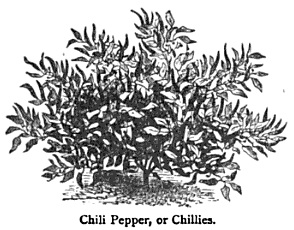 “The Capsicum Habit is discussed by Mr. J. H. Hart in the Mirror, a Trinidad paper. He points out that but few people who habitually use capsicum in any form as a condiment, are aware, or will admit, that they are indulging in a habit which is highly pernicious and specially hurtful to the constitution. So fixed does the habit of using “pepper” become that many persons, accustomed to its use, cannot enjoy a meal without their beloved pepper, in one of its many forms. One individual who advanced special arguments as to capsicum being good for digestion, being an appetiser, good for the liver, etc., is now a confirmed dyspeptic*, and a needle-woman who used to consume with her breakfast two or three large capsicums became a chronic dyspeptic, and only obtained relief by abandoning the vegetable. A high official in Trinidad once entered upon a discussion of the virtues of hot pepper, and, like many another converted one, told the story of his conversion. He said that one day he observed a pet monkey very sick, and refusing all offers of food. Thinking to trick him, a “hot pepper,” or capsicum, was offered, and, contrary to expectation, was greedily eaten. The monkey got better, and the official was convinced of the virtues of hot peppers. That official, however, become a martyr to dyspepsia. A man or woman may certainly have dyspepsia without being a capsicum eater, and a man may have his food flavoured with capsicum for years without becoming a confirmed dyspeptic, but when capsicum is taken largely and regularly the result is as certain as in the case of the opium or ganja smoker. The evil result of capsicum eating is only recently becoming recognised, and investigations have already shown the pernicious character of the habit. Further investigation will probably prove that many of the ailments of the tropics are actually caused by indulgence in ‘hot peppers.’ In moderation, of course, capsicum is useful as a condiment, but the habitual or excessive use of it is stated to be sure to result in impaired health and shortening of life.” From: Pharmaceutical Journal, Volume 63. Pharmaceutical Society of Great Britain. London: J. Churchill, 1899.
“The Capsicum Habit is discussed by Mr. J. H. Hart in the Mirror, a Trinidad paper. He points out that but few people who habitually use capsicum in any form as a condiment, are aware, or will admit, that they are indulging in a habit which is highly pernicious and specially hurtful to the constitution. So fixed does the habit of using “pepper” become that many persons, accustomed to its use, cannot enjoy a meal without their beloved pepper, in one of its many forms. One individual who advanced special arguments as to capsicum being good for digestion, being an appetiser, good for the liver, etc., is now a confirmed dyspeptic*, and a needle-woman who used to consume with her breakfast two or three large capsicums became a chronic dyspeptic, and only obtained relief by abandoning the vegetable. A high official in Trinidad once entered upon a discussion of the virtues of hot pepper, and, like many another converted one, told the story of his conversion. He said that one day he observed a pet monkey very sick, and refusing all offers of food. Thinking to trick him, a “hot pepper,” or capsicum, was offered, and, contrary to expectation, was greedily eaten. The monkey got better, and the official was convinced of the virtues of hot peppers. That official, however, become a martyr to dyspepsia. A man or woman may certainly have dyspepsia without being a capsicum eater, and a man may have his food flavoured with capsicum for years without becoming a confirmed dyspeptic, but when capsicum is taken largely and regularly the result is as certain as in the case of the opium or ganja smoker. The evil result of capsicum eating is only recently becoming recognised, and investigations have already shown the pernicious character of the habit. Further investigation will probably prove that many of the ailments of the tropics are actually caused by indulgence in ‘hot peppers.’ In moderation, of course, capsicum is useful as a condiment, but the habitual or excessive use of it is stated to be sure to result in impaired health and shortening of life.” From: Pharmaceutical Journal, Volume 63. Pharmaceutical Society of Great Britain. London: J. Churchill, 1899.
And the debate goes on more than one hundred years later.
*Dyspepsia (from the Greek δυσ- dys- and πέψις pepsis “digestion”), also known as upset stomach or indigestion, refers to a condition of impaired digestion. It is a medical condition characterized by chronic or recurrent pain in the upper abdomen, upper abdominal fullness and feeling full earlier than expected when eating. It can be accompanied by bloating, belching, nausea, or heartburn.









